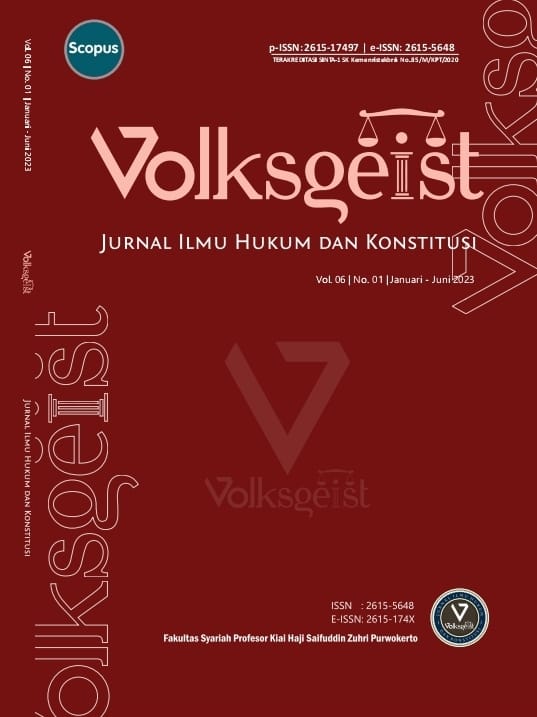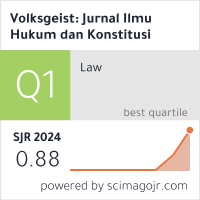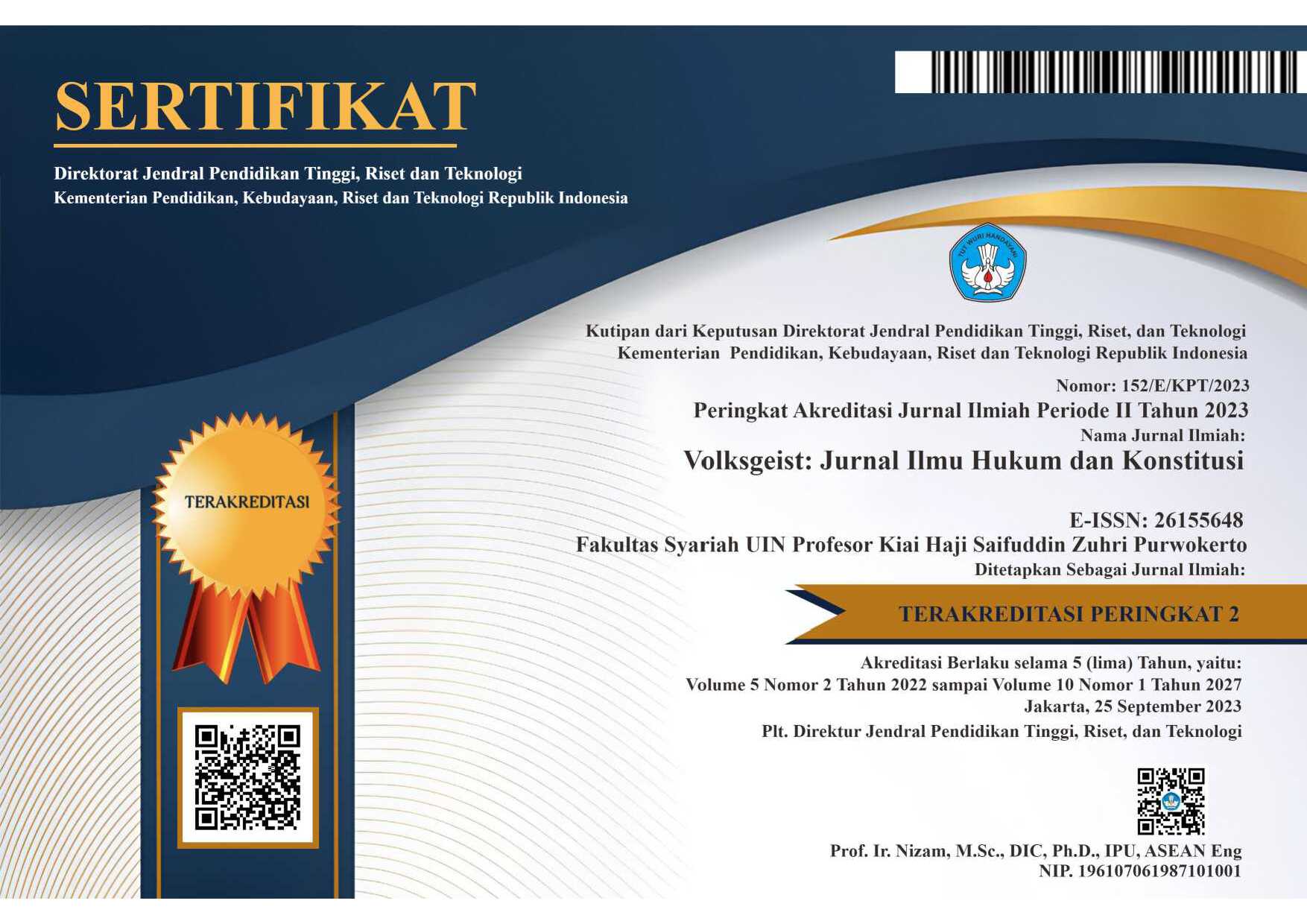Assessing the Impact of Electronic Court Systems on the Efficiency of Judicial Processes in the Era of Digital Transformation
DOI:
https://doi.org/10.24090/volksgeist.v6i1.8082Keywords:
Digital transformation; e-court; judicial process’s efficiency.Abstract
The E-court system promotes the transparency and efficiency globally, however, the Eastern Indonesian courts face challenges due to infrastructure and literacy. Nonetheless, its benefits are crucial for the justice system modernization. This study evaluated the E-court system’s effect on the judicial process’s efficiency in the Religious and District Courts of Biak Numfor using a quantitative research methodology. A survey was conducted on 100 respondents to assess the user satisfaction and system effectiveness, especially in remote areas. The data were analyzed using descriptive analysis and simple linear regression, which will provide valuable insights. The findings indicate that the E-court system significantly and positively affects the judicial process’s efficiency, and users found it efficient, user-friendly, reliable, secure, and satisfactory. While the quantitative approach provides valuable insights, it also has limitations. Therefore, the study suggests that a qualitative approach could provide a deeper understanding of how information technology affects the justice system. The research results can be useful to the courts in other areas that are considering implementing comparable technologies to enhance process efficiency and user friendliness. In conclusion, the E-court system is a promising technology that can significantly improve judicial process’s efficiency and effectiveness. However, further research is a necessity to understand how information technology affects the justice system, and a combination of quantitative and qualitative approaches may provide a more comprehensive understanding.Downloads
References
Ahmed, Rozha Kamal, Khder Hassan Muhammed, Ingrid Pappel, and Dirk Draheim. “Impact of E-Court Systems Implementation: A Case Study.” Transforming Government: People, Process and Policy 15, no. 1 (2021): 108–28. https://doi.org/10.1108/TG-01-2020-0008.
Ahyani, Hisam, Muhamad Ghofir Makturidi, and Muharir Muharir. “Administrasi Perkara Perdata Secara E-Court Di Indonesia.” Batulis Civil Law Rev 2, no. 1 (2021): 56–65. https://doi.org/10.47268/ballrev.v2i1.521.
Ali, Nur Atira, Muammar Bakry, and Abdul Rahman R. “Penerapan Aplikasi E-Court Di Pengadilan Agama Sungguminasa Kelas I B.” Jurnal Al-Qadau: Peradilan Dan Hukum Keluarga Islam 9, no. 1 (2022): 102–11. https://doi.org/10.24252/al-qadau.v9i1.27156.
Anwar, Iryana, and Muslim Lobubun. “The Role and Function of Legal Aid Posts (Posbakum) at Biak’s Religious Court Class IIB.” Volksgeist: Jurnal Ilmu Hukum Dan Konstitusi 4, no. 2 (2021): 139–151. https://doi.org/10.24090/volksgeist.v4i2.5184.
Bhat, P. Ishwara. “Quantitative Legal Research.” In Idea and Methods of Legal Research, 383–466. Oxford: Oxford University Press, 2019. https://doi.org/10.1093/oso/9780199493098.003.0013.
Dothan, Shai. “A Guide to Quantitative Legal Research.” In ICourts Working Paper Series No. 221, 1–20, 2020. https://dx.doi.org/10.2139/ssrn.3719836.
Endri, Endri. “Urgency And Mechanism of Electronic Evidence Validation In Electronic Court Evidence Rules.” Jurnal Hukum Peratun 4, no. 1 (2021): 89–104. https://doi.org/10.25216/peratun.412021.89-104.
Iqbal, Muhamad, Susanto Susant, and Mohammad Sutoro. “Efektifitas Sistem Administrasi E-Court Dalam Upaya Mendukung Proses Administrasi Cepat, Sederhana Dan Biaya Ringan Di Pengadilan.” Jurnal Ilmu Hukum: Fakultas Hukum Universitas Riau 8, no. 2 (2019): 302–15. http://dx.doi.org/10.30652/jih.v8i2.7286.
Krisyulaeni, Krisyulaeni. “Eksistensi Pemberlakuan Sistem E-Court Dalam Peradilan Tata Usaha Negara Di Indonesia.” Yustitia 7, no. 2 (2021): 209–223. https://doi.org/10.31943/yustitia.v7i2.140.
Kurniati, Ifah Atur. “Mengembalikan Citra Peradilan Melalui E-Court.” In Conference On Communication and News Media Studies, 176–85, 2019. https://proceeding.umn.ac.id/index.php/COMNEWS/article/view/1093.
Latifiani, Dian. “Human Attitude and Technology: Analyzing a Legal Culture on Electronic Court System in Indonesia (Case of Religious Court).” Journal of Indonesian Legal Studies 6, no. 1 (2021): 157–84. https://doi.org/10.15294/jils.v6i1.44450.
Mahardhika, Vita. “An Electronic Court in the Perspective Criminal Law Reform.” In Proceedings of the International Joint Conference on Arts and Humanities 2021 (IJCAH 2021), 894–98. Atlantis Press SARL, 2021. https://doi.org/10.2991/assehr.k.211223.154.
Muhammad Luthfi Hendrato, Arief Subyantoro, and Wisnalmawati Wisnalmawati. “The Effect of Organizational Culture and Information Technology on Employee Performance with Employee Satisfaction as a Mediator in The Electronic Court System (E-Court) in District Court of Sleman, Yogyakarta.” In Proceedings of the 4th International Conference on Sustainable Innovation 2020-Accounting and Management (ICoSIAMS 2020), 242–46. Atlantis Press, 2021. https://doi.org/10.2991/aer.k.210121.033.
Pratiwi, Sahira Jati, Steven Steven, Adinda Destaloka Putri, and Permatasari. “The Application of E-Court as an Effort to Modernize the Justice Administration in Indonesia: Challenges & Problems.” Indonesian Journal of Advocacy and Legal Services 2, no. 1 (2020): 39–56. https://doi.org/10.15294/ijals.v2i1.37718.
Purnama, Panji, and Febby Mutiara Nelson. “Penerapan E-Court Perkara Pidana Sebagai Salah Satu Upaya Terwujudnya Integrated Judiciary Dalam Sistem Peradilan Pidana Di Indonesia.” Jurnal Rechts Vinding: Media Pembinaan Hukum Nasional 10, no. 1 (2021): 97–116. http://dx.doi.org/10.33331/rechtsvinding.v10i1.661.
Septiar, Raden Raffi, and Sholahuddin Harahap. “Implementasi Pengadilan Elektronik (E-Court) Pada Badan Peradilan Di Indonesia Dihubungkan Dengan Asas Sederhana Cepat Dan Biaya Ringan.” In Specia: Seinar Penelitian Sivitas Akademika Unisba, 902–7, 2019. http://dx.doi.org/10.29313/.v0i0.16368.
Setiawan, Annisa Dita, Artaji Artaji, and Sherly Ayuna Putri. “Implementasi Sistem E-Court Dalam Penegakan Hukum Di Pengadilan Negeri.” Jurnal Poros Hukum Padjadjaran 2, no. 2 (2021): 198–217. https://doi.org/10.23920/jphp.v2i2.352.
Shodikin, Akhmad, Asep Saepullah, and Imas Indah Lestari. “Efektivitas Penerapan Sistem E-Court Pengadilan Agama Dalam Perkara Perceraian.” Jurnal MEDIASAS : Media Ilmu Syari’ah Dan Ahwal Al-Syakhsiyyah 4, no. 2 (2021): 135–48. https://jurnal.kopertais5aceh.or.id/index.php/mediasas/article/view/290.
Susanto, Susanto, Muhamad Iqbal, and Wawan Supriyatna. “Menciptakan Sistem Peradilan Efisien Dengan Sistem E-Court Pada Pengadilan Negeri Dan Pengadilan Agama Se-Tangerang Raya.” Jurnal Cendekia Hukum 6, no. 1 (2020): 104–16. http://doi.org/10.33760/jch.v6i1.287.
Yuniar, Vania Shafira, Jihan Syahida Sulistyanti, and Dian Latifiani. “The Court Role In Providing E-Court System Education To Community: Post-Enactment Of Supreme Court Regulation Number 1 Of 2019.” Jurnal Ilmu Hukum Unifikasi 8, no. 1 (2021): 34–42. https://doi.org/10.25134/unifikasi.v8i1.3697.
Downloads
Published
How to Cite
Issue
Section
License
Copyright (c) 2023 Djamaludin Djamaludin, Muhammad Fahruddin Aziz, Yanuriansyah Ar-Rasyid, Iskandar Ali As-Sayyis

This work is licensed under a Creative Commons Attribution-ShareAlike 4.0 International License.
Copyright Notice
Authors who publish with this journal agree to the following terms: Authors retain copyright and grant the journal right of first publication with the work simultaneously licensed under a Creative Commons Attribution-ShareAlike 4.0 International License that allows others to share the work with an acknowledgment of the work's authorship and initial publication in this journal.











